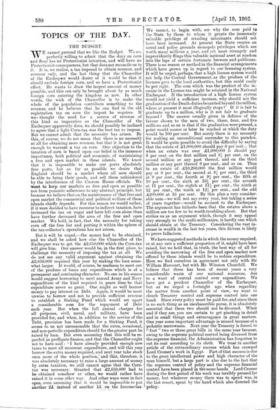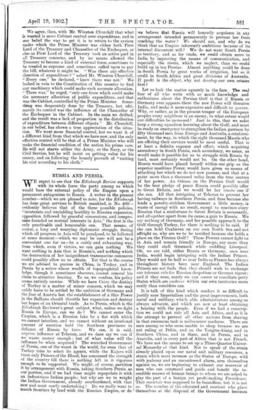TOPICS OF THE DAY.
THE BUDGET.
T7E cannot pretend that we like the Budget. We art perfectly willing to admit that the duty on corn and flour has no Protectionist intention, and will have no Protectionist consequences, but that does not reconcile us to it. It is, we realise, a tax imposed to obtain revenue, and revenue only, and the last thing that the Chancellor of the Exchequer would desire of it would be that it should exclude foreign corn, and so have a Protectionist effect. He wants to draw the largest amount of money possible, and this can only be brought about by as much foreign corn entering the kingdom as now. In other words, the wish of the Chancellor is to make the whole of the population contribute something to the revenue, and he believes that he can find in the old registration tax on corn the impost he requires. If we . thought the need for a source of revenue of this kind as imperative as the Chancellor of the Exchequer apparently does, we should possibly be inclined to agree that a light Corn-tax was the best tax to impose. But we cannot admit that the necessity has arisen. By this, of course, we do not mean that there is no necessity at all for obtaining more revenue, but that it is not great enough to warrant a tax on corn. Our objection to the taxation of corn is based upon our belief in the immense importance, both political and economic, of maintaining a free and open market in these islands. We know that it is impossible to make our ports absolutely free ports, but as far as possible we desire that England should. be a, market where all men should be able to bring their goods, and sell them unhindered by the interference of the Custom House officials. We want to keep our markets as free and open as possible not from pedantic adherence to any abstract principle, but because we believe that on the maintenance of that free and open market the commercial and political welfare of these islands chiefly depends. For this reason we would rather, if it were decided to have recourse to indirect taxation, have increased the tax on sugar and have left corn alone than have further decreased the area of the free and open market. We hold, in fact, that the necessity for taking corn off the free list and putting it within the sphere of the tax-collector's operations has not arisen.
But it will be urged,—the money had to be obtained, and we shall be asked how else the Chancellor of the Exchequer was to get the £2,650,000 which the Corn-tax will give him. Our answer would be, in the first place, to challenge the necessity of imposing the tax at all. We do not see any valid argument against obtaining the £2,650,000 required this year by making the loan some- what larger. It would, of course, be madness to meet out of the produce of loans any expenditure which is of a permanent and continuing character. No one in his senses would suggest borrowing to meet annual Army and Navy expenditure of the kind required in peace time be that expenditure never so great. One might as well borrow money to pay interest on Debt. Again, it would be most unwise to borrow and not to provide sufficient revenue to establish a Sinking Fund which would set apart a considerable sum for the repayment of Debt each year. But when the full annual charges for all purposes, civil, naval, and military, have been provided for, and when, in addition to the service of the Debt, provision has been made for a Sinking Fund, it seems to us not unreasonable that the extra, occasional, and non-periodic expenditure should for the greater part be raised by loan. But even assuming that this will be re- garded as profligate finance, and that the Chancellor ought not to have said : I have already provided enough new taxes to meet all recurrent expenditure, and will this year borrow the extra money required, and next year take stock once more of the whole position,' and th-at, therefore, it was absolutely necessary to raise a large amount of money by extra, taxation, we still cannot agree that the Corn- tax was necessary. Granted that £2,650,000 had to be obtained somehow or other, we would rather have raised it in some other way. And other ways were in fact open, even assuming that it would be impossible to put another 2d. instead of another ld. on the Income-tax. We cannot, to begin with, see why the sum paid to the State by those to whom it grants the immensely valuable privilege of retailing intoxicants should not Imve been increased. At present the State creates on moral and police grounds monopoly privileges which are worth many millions a year, and yet most strangely and improvidently flings this valuable national asset at random into the laps of certain fortunate brewers and publicans. There is no reason or method in the financial arrangements which have grown up in regard to our licensing system. It will be urged, perhaps, that a high license system would not help the Central Government, as the produce of the licenses goes to the local authorities, but this could easily be put right. The sum which was the product of the in- crease in the License-tax might be retained in the National Exchequer. If the introduction of a high license system would not yield a sufficient increase, why should not the graduation of the Death-duties be carried beyond the million, where at present it most illogically stops ? If it is fair to graduate up to a million, why is it not fair to graduate beyond ? The answer usually given in defence of the favour shown to the men of two, three, four, and five millions and so on is that if the graduation were pressed, a point would sooner or later be reached at which the duty would be 100 per cent. But surely there is no necessity for making an unconditional surrender to this paradox. It would be quite possible to avoid the difficulty by saying that the estate of £1,000,000 should pay 8 per cent. ; that when an estate was over £1,000,000 it should pay 8 per cent. on the first million and 83 per cent. on the second million or any part thereof, and on the third million or any part thereof 9 per cent., and so on. Thus in an estate of £10,200,000 the first million would pay at 8 per cent., the second at 83 per cent., the third at 9 per cent., the fourth at 91 per cent., the fifth at 10 per cent., the sixth at 101 per cent., the seventh at 11 per cent., the eighth at 111 per cent., the ninth at 12 per cent., the tenth at 122 per cent., and the odd £200,000 at 13 per cent. By this plan a very consider- able sum—we will not say every year, but taking a series of years together—would be secured to the Exchequer. The argument has hitherto been that the estates above a million are too few to be worth troubling about. But that strikes us as an argument which, though it may appeal very strongly to the multi-millionaire, is hardly one which should obtain at the Treasury. Considering the vast in- crease in wealth in the last ten years, this dictum is likely to prove fallacious.
We have suggested methods in which the money required, or at any rate a sufficient proportion of it, might have been raised, but we hold that, in truth, the best way of all for avoiding the narrowing of the free and open market now offered by these islands would. be to reduce expenditure. Here we find ourselves in agreement not only with Sir William Harcourt, but with Mr. Winston Churchill. We believe that there has been of recent years a very considerable waste of our national resources, due to a want of central control over expenditure. We have got a prudent Chancellor of the Exchequer, but as we urged a fortnight ago when regarding the matter from another point of view, we want to clench Treasury control and supreme control into one hand. Since every policy must be paid for, and since there is no such thing as an inexhaustible purse, it is absolutely essential that these two should not be divorced. When and if they are, you are certain to get pinching in detail and in small things and extravagance in great matters. One year some important advantage is missed because of a pedantic narrowness. Next year the Treasury is forced to " foot " two or three great bills in the same year because, owing to the supreme political control being divorced from the supreme financial, the Administration has forgotten to cut its coat according to its cloth. We treat in another article of the extraordinary success which has crowned Lord Cromer's work in Egypt. Part of that success is due to the great intellectual power and high character of the man himself, but a large part is also due to the fact that the supreme control of policy and the supreme financial control have been placed in the same hands. Lord Cromer during the first period of his work was terribly pressed for money, but whatever money there was to spend was, in the last resort; spent by the hand which also directed the policy. We agree, then, with Mr. Winston Churchill that what is wanted. is more Cabinet control over expenditure, and in our belief the way to get it is to return to the system under which the Prime Minister was either both First Lord of the Treasury and Chancellor of the Exchequer, or else as First Lord of the Treasury took an active part in all Treasury concerns, and by no means allowed the Treasury to become a kind. of external force, sometimes to be treated as supreme and sometimes called upon to pay the bill, whatever it might be. " Was there any effective direction of expenditure ? " asked Mr. Winston Churchill, " Every one," he declared, " knew there was not." We looked in vain to the Constitution of this country to find any machinery which could make such accurate allocation. " There was," he urged, "only one force which could make the necessary allocation of public expenditure, and that was the Cabinet, controlled by the Prime Minister. Some- thing was desperately done by the Treasury, but ulti- mately its control was the influence of the Chancellor of the Exchequer in the Cabinet. In the main we drifted, and the result was a lack of proportion in the distribution of expenditure between different objects." Mr. Churchill, in our belief, has shown a true appreciation of the situa- tion. We want more financial control, but we want it of a different kind from that which we have now, and the only effective control will be that of a Prime Minister who will make the financial condition of the nation his prime care. He will not starve either the Army, or the Navy, or the Civil Service, but he will insist on getting value for his money, and on following the homely proverb of "cutting his coat according to his cloth."











































 Previous page
Previous page